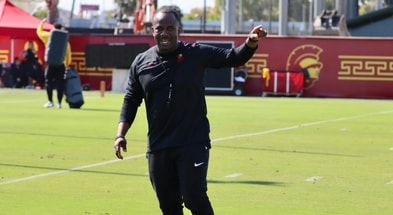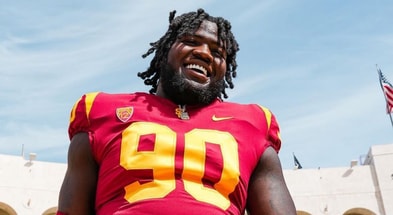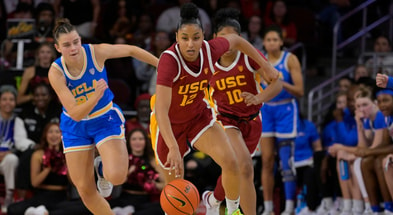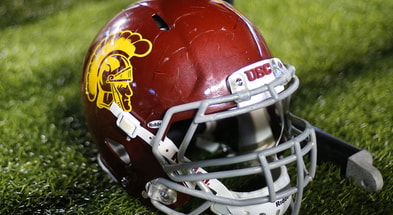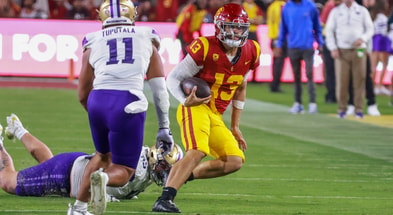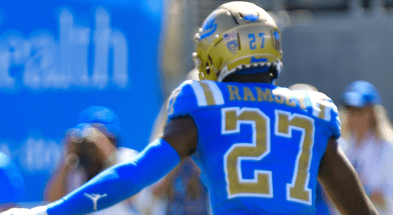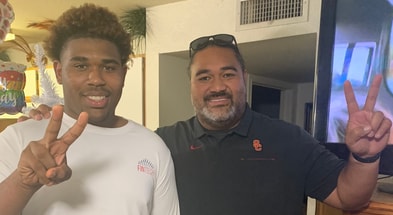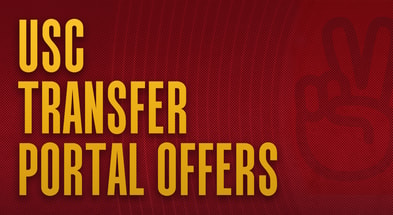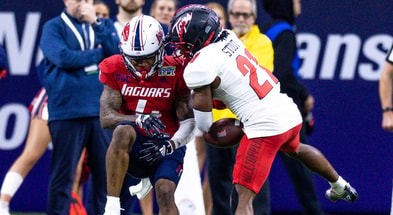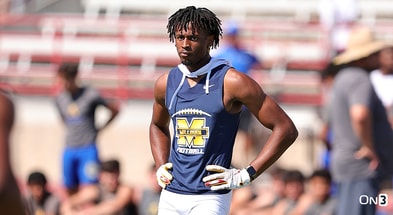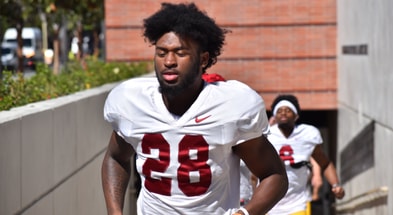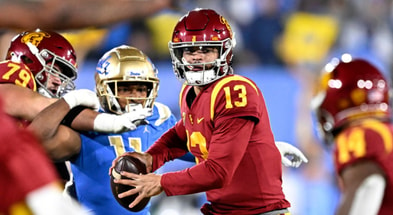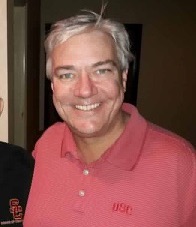USC OC Graham Harrell Q&A
New USC offensive coordinator Graham Harrell spoke with the media on Monday morning, answering questions about the quarterbacks, his path to USC, and what exactly he calls his offense.
Q: What do you call your offense?
Harrell: “I don’t mind people calling it the Air Raid if they want to call it the Air Raid. If you look at anyone that comes from coach Leach that gets tagged with an Air Raid Offense, none of us are the same. It’s kind of like the West Coast (Offense). The West Coast can be a 22-personnel offense, or it can be a spread offense. The West Coast is the terminology. The Air Raid Offense is more of a philosophy than actual Xs and Os. That’s what coach Leach has done such a good job of and why the Air Raid—or what they call the Air Raid—has had success no matter where it’s been. Again, to me, it’s more a philosophy than a scheme, and that philosophy is, ‘Keep it easy and let the guys go play.’
Put your guys in a position to be successful. It’s an execution-based offense. You’re not going to sit there and try to outscheme people. It’s an identity. It gives you an identity and says this is who we are and we’re going to be good at what we do. That’s kind of the approach we take. They can call us the Air Raid if they want. Again, I don’t really care. It’s a philosophy. A lot of it comes from coach Leach, but we have a lot more of a run game that goes with it. That’s where we vary from coach Leach the most, at North Texas, and where we’ll continue to vary from him. We believe in running the football and understand that, to win games, especially at a high level, you have to run the football successfully. I don’t mind being tagged the Air Raid, but we’re not exactly what Leach is, and no one is exactly what Leach is. So if you want the true Air Raid, you have to go find Mike Leach. But I do think that his philosophy and his style of offense and his touch has kind of been on all of us who have left him.”
Q: Is it easier to get players that are compatible to the offense, or do you need to reprogram players for it?
Harrell: “It doesn’t matter what level you’re on, including the NFL at this point, the spread offense has become what everyone is doing. I think there’s definitely kids come in with a familiar skill set. It’s not foreign language anymore like it used to be when Leach was first doing it. I do think that the movement to the spread offenses throughout high school has definitely helped the transition into college, and more than anything it’s allowing kids to play quicker. In the past, if you’re coming from an I-formation, option, whatever old school high school football was, it was an adjustment. Now, because everyone is doing it, no matter what the level, I think the adjustment happens a lot quicker. I think the other thing that has been big, especially for quarterbacks, is the growth of 7-on-7. I don’t think, obviously, you can judge kids on 7-on-7 or anything, but I do think a kid that, no matter what offense his high school is—because he probably does this 7-on-7 all summer and all spring, he is familiar with having to throw the football over and over and over, and seeing a lot a lot of different defenses, and familiar with most concepts. I don’t know if exactly the Air Raid is in all levels, but the spread offense is undeniable, it’s everywhere. I think it definitely helps with the transition.”
Q: Does California’s success with 7-on-7 help USC at all?
Harrell: “I sure hope so. I do think that helps the development of quarterbacks and receivers…You can’t replace reps, you can’t replace experience, that’s what I tell everyone. In the 7-on-7 game, I don’t think it’s fair to evaluate kids necessarily off what they can do in 7-on-7, because that’s not the game of football. But it is valuable reps. A lot of it—passing concepts are passing concepts. There’s only so many of them out there, you know what I mean? They’re getting really good reps with a great concept and seeing probably a million different defenses for every concept. Again, you cannot replace experience. You cannot replace reps. And so for, I don’t know how many months—six, seven months out of the year—all they’re doing is throwing the football and getting those valuable reps. I think it definitely gives us an advantage because kids are getting to do what we do, and kind of see things that they’re going to see at the next level. Again, I think in 7-on-7 they can get creative defensively—probably more creative than they will in high school football—and because of that, guys are getting to see different defenses and getting reps against different defenses and it’s just going to make them that much better and that much more ready.”
Q: What are your thoughts about your rapid rise from support staffer to offensive coordinator?
Harrell: “I’ve been fortunate. The rise of the Air Raid, or spread offense, has obviously helped with that. My playing career obviously helped with that as well. Again, I’ve been fortunate and I don’t think that five years ago I would have said, yeah, I plan on being the OC at USC in five years, but I’m excited to be here. Again, I do feel fortunate and I grew up in a football family, so I think that helped. I know it helped getting back there to North Texas, and then the success we had there helped me get to here. It’s been a fast rise and an exciting one, but I’m excited to be here and it’s going to be a fun ride.”
Q: How did this opportunity (USC offensive coordinator) come about?
Harrell: “It was kind of a random deal, honestly. North Texas is a great place and that’s kind of home for me and my wife. We were comfortable there, close to family. We have a great team coming back, especially offensively. We have a little quarterback back in North Texas that was special. He was going to be a senior. Basically their whole offense was going to be seniors. So I wasn’t looking for a job at all. I actually turned a couple jobs down because I felt like we had a chance to be special. Then just kind of out of nowhere coach Helton called me. USC is a top-5, 10, program ever. Those jobs don’t come around very often because they aren’t open very often. So when a job like that comes around, it’s a lot more interesting than the other jobs that came around. He called me. We had a few conversations over the phone. That was probably on Tuesday or Wednesday. We talked throughout the week. He flew me out here on Sunday and offered me the job while I was here, offered me the job, and I think I took it on that Monday. It was kind of a week process, I guess, but that’s kind of how it happened. Again, I wasn’t necessarily looking for a job, but a job like this is maybe a once-in-a-career opportunity and something I couldn’t pass on.”
Q: What are your impressions of this USC roster?
Harrell: “They look a lot different than the guys I’ve had, that’s for sure. When I came on that Sunday, he showed me some clips of a lot of the guys and really after I talked to him the first time he called me, I got our video guys at North Texas to get video because I just wanted to watch some games just to see what they had. And especially at the receiver position, it excited me. I think we have a great group of receivers that can do a lot of special things, and my job is to put those guys in a position to be successful, and that’s what I think, again, kind of the philosophy of the Air Raid—keep it simple, get your playmakers the ball in space and let them do what they do. Watching them, I got really excited thinking there could be an actual fit there. I don’t think you have to go in and revamp the personnel to fit what we do. The talent is there. Just have to get them excited about what we’re doing and put those guys in a position to be successful and let them go do what they do.”
Q: What are your thoughts on JT Daniels?
Harrell: “He can throw it. I’m excited because in about a week I’ll get to work with him myself and really get to see him. You can’t deny his talent. He’s a special talent and to be able to come in basically as a high school senior—graduate early like he did, when he should have been a high school senior—and come in and play at this level speaks volumes about him. He’s obviously got a lot to him and is a talented player. And like I said, I’m excited to get to watch him work in about a week and see what we got.”
Q: What was your experience like playing in the Air Raid?
Harrell: “When I went to (Texas) Tech, I think just like anyone who gets recruited, they think they’re ready to play when they step on campus. I went in, obviously redshirted, and the next year was competing that spring and broke my ankle, so the other guy won the job. The next year, my redshirt sophomore year, was when I became the starter. The whole philosophy of what we do is keep it simple. If the quarterback is overthinking, then I’m not doing my job well. I got to spend about four year at Green Bay and I think the best thing about my time at Green Bay was that I got to see it done a different way, and I got to see it called a different way. And I think it really strengthened my belief in the way we do things here. Theirs is a West Coast Offense and the play book is this big and every play feels like a paragraph. It looks like this right here (points to reporter’s notepad), this whole paragraph he’s got written here is what each play call looks like. I used to tell them all the time, ‘If you pay me enough money, I’ll simplify this whole thing for you and make it a lot easier.’ They didn’t like that. It was like a badge of honor that they could remember a paragraph. It’s crazy, because you can remember the paragraph, but I can’t remember the paragraph and neither can anyone in here, so you’re not doing us any favors. It was a great experience and I got to learn a lot of great things, but more than anything it just restrengthened the way that I thought was the best way to do things. I think it strengthened that it’s the best way to do things, or it puts players in the best position to be successful, and that’s our job as coaches. Can we make it simple and let those guys not think, and just go play? I do think the way we do things allows the players to do that, and so as a quarterback, I think the learning curve is sped up tremendously because we’re going to try to say, ‘Hey, don’t think. Play. We’re going to keep it as simple as we can for you and you’re going to be free to go play and attack them.’”
Q: What is the structure of the offense in terms of calling plays?
Harrell: “We call plays, for sure. As they get comfortable, I’ll let them do about what they want. Coach Leach always told me this—and I don’t ever tell my quarterbacks this—he said, ‘What I’m giving you is a suggestion. You can call whatever you want.’ That’s kind of his philosophy. Now, I will let my quarterbacks, if you see something, check what you want. It’s not like you have this or that. If you see a way you can attack them and you feel good about it, get us into it and let’s roll. We’re going to let those guys play and again, if they see something and they feel good about a play and they want to change the play that I called for them, I’m fine with that. I’ll send in a play and the longer they’re in it, the more experience they have in the offense, the more comfortable they’ll feel checking plays. Early on, they’ll just check an individual route or something, and I’m fine with that too. But as they really get comfortable in it, there’s times where they’ll call and entirely different play, and I don’t care. Just make it work, that’s kind of my philosophy. But if it didn’t work, I’ll tell them that was a dumb idea. If it did work, I’ll say great idea. I’ll give them a lot of that freedom, but I’ll call the play. We’re going to try to play fast and execute, but if they see something they like and they want to attack, I’ll let them go do it.”
Q: What were your playcalling duties at North Texas?
Harrell: “He (Seth Littrell) let me call it from Day 1 and that was one of the main reasons I went. With coach Leach, where I was, you’re never going to be the quarterback coach, number one, and number two, you’re never going to be able to call plays. That’s fine. He’s obviously great at what he does. But that’s obviously something I wanted to do, so coach Littrell told me you’re going to coach quarterbacks and you’re going to call plays, too, and that was a huge help for me. Early on, he was pretty involved, like early on a Monday, especially in the run game stuff. As we went, he kind of stepped further and further away from me with that, I guess because we had been together for a while. That was the dynamic there, and he was great to me. A lot of the run game stuff we do, I think is really good, and it takes the pressure off of that quarterback. And that’s the thing, if the quarterback is not on early on, you have to find a way to take pressure off him, and I think that’s what the run game does for you—takes pressure off the quarterback and gives you a chance to win football games even if he’s not having his best night, because it’s hard to be on for 12, 14, 15-straight weeks, whatever it is.”
Q: What are your impressions of the USC running backs?
Harrell: “I love those guys. Vae (Vavae Malapeai) was a guy I saw early on and he’s just a guy that seems to love football, and that’s the most important thing to me is you have to have people who love football. He runs tough. He gets tough yards, and that’s what you have to be able to do. Kese (Markese Stepp) is the same way, and from what everyone says is nobody wants to tackle the guy. That’s always obviously a benefit as far as him getting tough yards. A lot of times, I think short yardage—third and short, fourth and short, goal line areas—it has very little to do with scheme, because they’re always going to have more people in there than you. You have to have a running back who wants to go get across the line more than the defense wants to stop him, and I think those two guys do a great job of that. And then you’ve got (Stephen) Carr, and again, I haven’t seen many of them play, but from what everyone says, is kind of the homerun hitter, but I have gotten to spend some time with him in the weight room, watch him run around on the field a little bit, and really as a whole team, what’s impressed me about the whole team is the willingness to work, and the want to. And that’s a huge part of winning, is how much do they love football and how much do they want to work for it. Work is not a problem with these guys. They all want to work. They all do a great job working. But those three guys all love football. When you get them on the field, they do everything right. They work extremely hard and because of that, they’re going to be really good football players.”
Q: With the chatter about Clay Helton’s job security, is this a pressure-filled situation?
Harrell: “Not really. I mean all jobs are pressure, right? My overall attitude is we’re playing football. At the end of the day, what’s the worst that can happen to you? We get paid a lot of money to get coach a game that you played as a little kid because you loved it, so I don’t ever worry too much about pressure. The great thing about USC is—and I haven’t been here long enough to have really seen this, but the little that I’ve seen—that I don’t really think it matters if you go 5-7 or if you win a Rose Bowl, the next year there’s always pressure because they want you to win again. But that’s one of the things that most intrigued me about this job. A lot of jobs throughout the country, you can be average and everyone is happy with you. But you don’t get into this profession to be average. You get into this profession to win championships. Realistically, there aren’t many schools in the country where you can win a national championship. Let’s just be honest. Even Texas Tech, when I was there, was a great school and we had some great football teams, but everything in the world would have had to have fallen perfectly. If we go 12-0, maybe we play in it (National Championship), but even still they probably get one of the elite schools in the country in. There just aren’t that many schools where every year you feel you legitimately have a chance to play in the playoffs, play in big time bowls, play in the Rose Bowl, win the national championship, and SC is one of those. First off, you can’t worry about (expectations). I’m sure we put higher expectations on ourselves than anybody. But the reason I came here was because there aren’t many times in you’re career that you’re going to be at a place where you have a legit chance to win national championships year in and year out, and if you ever get one of those schools, you better jump on it, because you may never get it again. That’s why I’m here. I think every year, I would assume, at this place, your job security is uncertain because whether you won a Rose Bowl or whether you won five, they want you to win another one. That’s just part of being at one of the elite programs in the country and again, one of the reasons I want to be here, because you do have that opportunity and those expectations are there. The players understand that, the coaches understand that, and so we expect to win.”
Q: Where was the disconnect with the offense last year?
Harrell: “I have no idea. I don’t know. They have talent and when you lose the No. 3 overall draft pick, that probably hurts you—especially when he comes out early. This is all speculation, so really I can’t speak on that, but I’m sure losing (Sam) Darnold hurt, especially if you weren’t planning on losing him. They’re a talented crew. They want to work. We just have to energize them, get the excited about football—I think they are excited—and free them up to play. That’s what I believe about any players. If you can eliminate thinking and just free them up to play, then you’re going to put them in a position to be successful and they’ll be great. That’s what we’re going to try to do.”
Q: What are some things you’ve learned from your playing and coaching experience under Mike Leach?
Harrell: “The two things I’ve taken the most from him: Number 1, keep things simple. There’s a lot of great football out there and I don’t think there’s any magic Xs and Os and I don’t think the Air Raid offense is some magic Xs and Os offense, and like I said earlier, I really don’t think it is an s and Os offense, I think it’s a philosophy. And I don’t believe there’s any magic or anything secret to what we do. It doesn’t matter, if any college or high school, they can come sit in there and I’ll tell them exactly what we’re doing, because I don’t think what we’re doing is different than what anyone else is doing. I think there’s a lot of great offenses out there and a lot of great plays out there. You just can’t be great at all of them. And that’s what I think Leach does an unbelievable job of is saying, ‘We’re just going to be great at these plays.’ And that’s it. I’m not going to worry about all the great stuff that’s out there or anything else. This is what we’re going to do, and we’re going to be really, really good at it. I’ve tried to take that philosophy with me as much as anything, because I think that’s why he’s had success. And the other thing is be loose and have fun. I think Leach does a great job with that, making sure his guys aren’t ever too tight or ever too stressed. We’re playing a game, so go have fun. That’s kind of what we try to do. Be loose, have fun, and we’re going to set standards and hold them to those standards and be tough on them, but they’re going to know that we love them and we’re going to go out there and have fun and enjoy—we’re living in Southern California and playing football, so what’s not to enjoy? That’s kind of going to be our philosophy. Let’s go play football, let’s go have fun. Be loose. Don’t overthink it. And I think a lot of that comes from coach Leach. He’s different, so there’s some things you don’t want to take, but those two things are definitely things that I try to take as far as, we’re going to be simple in what we do, we’re going to be good at what we do, we’re going to have an identity, and we’re going to have fun doing it. I think if you do that, you’re going to have a chance.”
Q: Will there be an open quarterback competition this spring?
Harrell: “Every position is open because I don’t have any preconceived notions about any of them. I think, from what I said, JT is obviously very talented, Again, we’re going to try to simplify things and give every one of those guys the best chance to be successful and play to all their skillsets—simplify it all, take the thinking out of it, and let them go use their skillsets. If they weren’t talented, they wouldn’t be at USC. We’ll see which one does it best. I’m excited about JT because he’s done a lot of great things on tape, but I’m excited about all of them. Jack 9Sears) has a different skill set as far as athleticism. He’s big, he’s thick, he can run well. From what I can see in three weeks, Jack’s a great leader, he works his tail off, so I’m excited about him. (Matt) Fink’s as competitive as anyone I’ve been around. I think that’s his biggest strength. Again, this is all from a three-week evaluation, but he competes every day. And then Kedon (Slovis) is a really fluid thrower. With those four guys in there, I’m excited about getting to watch all of them play and see what they can do. Again, we’re going to try to let their talents be free and see which one fits us best.”
Q: How much interaction have you had with the quarterbacks so far?
Harrell: “More than anything I’ve just watched them work out, because of the time of year and compliance rules don’t let us do too much with them. So every day when they go work out or run around on the field, we go down there and watch them and encourage them and see them work from that standpoint. And I told them if they ever want to come up and talk or look at anything, you’re welcome to do that, so they’ve all come up to do that or just hang out or ask me about something on tape, because our stuff is on the system, so they can watch it and ask me questions about it. So I’ve gotten to do some of that with them. They all seem sharp. They all seem extremely eager to learn it and go compete, and in the weight room they’re working well. So it’ll be a fun group to work with.”
